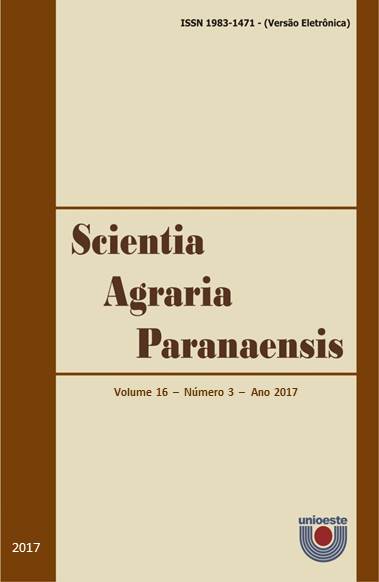Electrical conductivity test applied to seeds of forest species
Agências de fomento
Palavras-chave:
Amendoim-do-campo, Indicador Bioquímico, Ipê-amarelo, Pau-de-alho, Rabo-de-bugio.Resumo
The evaluation of electrical conductivity is one of the fastest tests to evaluate quality and vigour of the seed, however, studies with forest species are scarce. Thus, the aim of this work was to verify the possibility to evaluate the physiological quality of forest seed species by the individual and massal electrical conductivity test in different soaking periods. The experimental material consisted of seeds of the Gallesia integrifolia, Handroanthus chrysotrichus, Lonchocarpus campestris and Pterogyne nitens. For the individual method, 80 repetitions of one seed were used, which were placed in individual containers containing 50 ml of distilled water. The evaluated soaking periods were 2, 4, 6, 8, 24 and 48 h. The tests were placed in a germinator BOD chamber with a constant temperature of 25 ºC. Individual electrical conductivity test was efficient to evaluate the physiological quality of seeds. Periods of soaking best suited to evaluate the physiological quality of seeds, the electrical conductivity test were 48 h to G. integrifolia, 2 h to H. chrysotrichus and 24 h for L. campestris.Downloads
Arquivos adicionais
Publicado
09-10-2017
Como Citar
GUOLLO, K.; POSSENTI, J. C.; DEL QUIQUI, E. M.; FELIPPI, M.; DEBASTIANI, A. B. Electrical conductivity test applied to seeds of forest species. Scientia Agraria Paranaensis, [S. l.], v. 16, n. 3, p. 374–382, 2017. Disponível em: https://e-revista.unioeste.br/index.php/scientiaagraria/article/view/14349. Acesso em: 7 dez. 2025.
Edição
Seção
Artigos Científicos
Licença
Aviso de Direito Autoral Creative Commons
Política para Periódicos de Acesso Livre
Autores que publicam nesta revista concordam com os seguintes termos:
1. Autores mantém os direitos autorais e concedem à revista o direito de primeira publicação, com o trabalho simultaneamente licenciado sob a Licença Creative Commons Attribution que permite o compartilhamento do trabalho com reconhecimento da autoria e publicação inicial nesta revista.2. Autores têm autorização para assumir contratos adicionais separadamente, para distribuição não-exclusiva da versão do trabalho publicada nesta revista (ex.: publicar em repositório institucional ou como capítulo de livro), com reconhecimento de autoria e publicação inicial nesta revista.
3. Autores têm permissão e são estimulados a publicar e distribuir seu trabalho online (ex.: em repositórios institucionais ou na sua página pessoal) a qualquer ponto antes ou durante o processo editorial, já que isso pode gerar alterações produtivas, bem como aumentar o impacto e a citação do trabalho publicado (Veja O Efeito do Acesso Livre).
Licença Creative Commons
Esta obra está licenciada com uma Licença Creative Commons Atribuição-NãoComercial-CompartilhaIgual 4.0 Internacional, o que permite compartilhar, copiar, distribuir, exibir, reproduzir, a totalidade ou partes desde que não tenha objetivo comercial e sejam citados os autores e a fonte.


